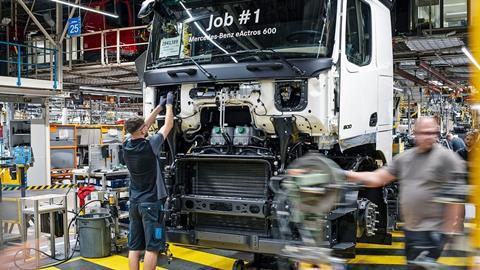Daimler Truck launched the series production of the eActros 600 today (22 November) at the Mercedes-Benz plant in Wörth, with a plea for a faster roll-out of the public charging infrastructure.
The Mercedes-Benz eActros 600 is the third electric truck, after the eActros 300/400 and the eEconic, to go into series production at the German plant, and the first truck in which assembly takes place in one production hall.
The vehicles being built in series production in the first few months will be primarily being used as demonstration vehicles for company-owned sales and service outlets and dealers.
The eActros 600 has a battery capacity of over 600 kilowatt hours, giving it a range of 500 kilometers without intermediate charging, and a range of 1,000 kilometers with intermediate charging, which can be achieved during a driver’s statutory break.
The flagship electric truck has already been put through its paces during the eActros 600 European Testing Tour 2024, a 15,000 kilometer all-electric development trip through a total of 22 countries with a gross train weight of 40 tons.
In July this year the vehicle also completed a five-day, 1,400-mile journey around the UK hauling a standard trailer and fully freighted at 40 tonnes during the EV Rally event.
Karin Rådström, Daimler Truck chief executive said: “The start of series production of our eActros 600 is a further proof of our ambition to transform the industry.
“With a range of 500 kilometers on a single battery charge, our eActros 600 is addressing the long-haul segment in Europe which is responsible for two-thirds of CO2 emissions from heavy road freight. Our battery-electric long-haul truck will therefore make a real difference.”
Dr. Andreas Gorbach, Daimler Truck technology director, said the eActros 600 “will play a key role in the decarbonization of this important segment – thus, the start of production is an important milestone for us and our customers.
“Our plants in Gaggenau, Kassel and Mannheim are contributing key components. This shows the truck is not an individual effort, but a team effort. Now, the buildup of public charging infrastructure must follow – it is currently the bottleneck of decarbonization.”














